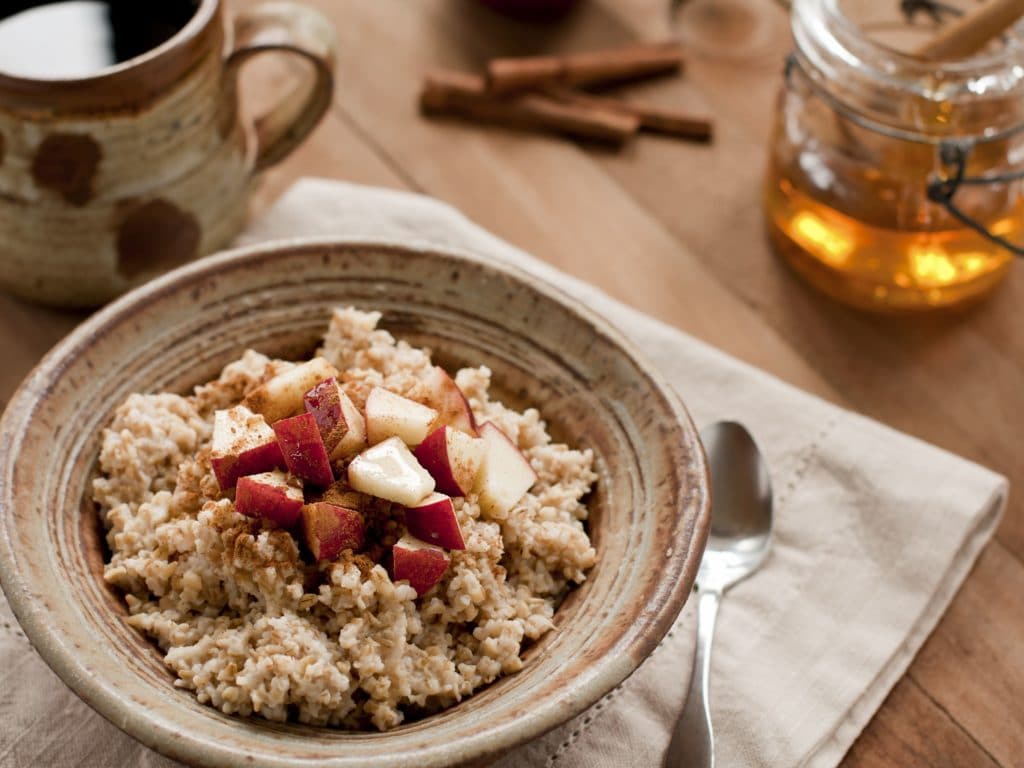Metabolism is a word used very loosely and often blamed for a lot of problems that we struggle with like fatigue and weight gain.
But when we understand the science behind our metabolism, we can use simple yet effective methods to boost our body’s metabolism and overcome some of these problems to achieve our health goals.
- What is Body Metabolism?
- Can Metabolism be Increased?
- 15 Ways to Boost Metabolism
- Eating a Healthy Breakfast
- Eat Enough Calories
- Lift Weights for Strength Training
- Regulate Sleep
- Eat at Regular Times
- Eat Enough Protein at Every Meal
- Doing High-Intensity Interval Training (HIIT)
- Drink Green Tea
- Drink Plenty of Water
- Stand More
- Reduce Stress
- Increase Fiber Intake
- Spice up Your Food
- Getting Enough B Vitamins
- Cook With Coconut Oil
- The Final Note
What is Body Metabolism?

Our body needs the energy to live and function properly. Metabolism is the sum of all the chemical reactions that take place in the body within each cell which provides energy to the body.
The rate at which the body is able to produce this energy is called the metabolic rate. Various factors play a role in how efficient our body is in this process like age, sex, race, exercise, and diet (1).
In other words, the higher the metabolic rate, the more calories you burn to provide energy for your body. It is easier to lose weight too when more calories are being burnt.
Can Metabolism be Increased?
It is true that each of our metabolic rates is different because genetics plays a major role in determining this. This is the reason you may find that a friend who eats more calories than you, doesn’t seem to gain weight at the rate you have been, even though you are eating fewer calories.
However, there are ways you can boost your metabolism. Here are 15 easy and effective ways you can increase your metabolism.
15 Ways to Boost Metabolism
Eating a Healthy Breakfast

Lately, skipping breakfast has become a trending topic and often shrouded in controversy. Although there is still a lot of debate over the old adage “eat breakfast like a king”, breakfast may still be the most important meal of the day when it comes to metabolism.
However, it is best not to worry about the size of the breakfast but focus more on what types of foods to include.
Studies have linked eating a wholesome breakfast with increased metabolism (2). It is not just a matter of eating breakfast but the nutrient content of the breakfast.
Choose low glycemic index foods like oats, whole grain bread and also include protein in the form of eggs or chicken. It is best to steer clear of sugary cereals (3).
Summary: Eating a high nutrient breakfast may give your metabolism a headstart to the day.
Eat Enough Calories
Crash diets are the worst thing to do to our bodies because it negatively affects metabolism. Although you may see temporary weight loss, it usually doesn’t provide any long term benefits. In fact, muscle loss is often reported which in turn slows down metabolism (4).
Instead, it is recommended to eat a substantial amount of calories depending on your age, weight, and activity levels to increase metabolic rate (5). If your body doesn’t get sufficient calories, then it puts a stop to the fat-burning process to preserve energy. This will eventually lead to muscle loss (6).
Eating enough calories to match your resting metabolic rate is important to keep the body’s metabolism revved up. Resting metabolic rate is the number of calories you burn when you are at rest and doing nothing.
Summary: Instead of skipping meals or reducing calorie intake drastically, it is recommended to eat sufficient calories to keep your metabolism going at a good rate.
Lift Weights for Strength Training

Our body is burning calories even when it is doing nothing and muscle mass has a higher metabolic rate than fat, which means that more energy is needed to preserve muscle than fat.
Studies show that muscle mass affects resting metabolism to a large extent (7). This means that by building muscle we significantly raise the number of calories we burn even at rest.
As we age, our muscle mass naturally reduces and our resting metabolic rate begins to drop. Weight training is the best way to keep that from happening (8, 9).
A study conducted amongst 14 subjects showed a direct relationship between the amount of muscle mass and the total energy expenditure (10).
A 2008 study amongst a few women in the USA determined that those who did regular resistance training retained their muscle mass, lost weight, and showed an increase in their resting metabolic rate. Those women who did other forms of workouts lost weight but also lost some amount of muscle mass and recorded a lower resting metabolic rate (11).
Summary: Building and retaining muscle by lifting weights helps in increasing the resting metabolic rate. Higher muscle mass increases the number of calories being spent even while resting.
Regulate Sleep
We must come to terms with the fact that we now live in a sleep-deprived society. Insufficient sleep or sleep deprivation has been associated as a major risk factor for obesity (12, 13). This is partly because of the effects that lack of sleep has on metabolism (14).
Sleep is very intricately linked to various hormonal and metabolic functions in our body and the importance of sleep is now being attested by a lot of research.
A 2004 study conducted with 1024 participants showed that the participants with shorter sleep had elevated levels of ghrelin, the hunger hormone, and lower levels of leptin, which is the hormone that usually makes us feel full. This could explain why people who are sleep deprived feel more hungry and gain weight easily (15).
Lack of sleep is also linked with problems with glucose metabolism and may increase the risk of insulin resistance and type 2 diabetes (16).
A study has shown that people with sleep debt have a lower glucose tolerance than those who are well-rested (17).
Summary: Having a good night’s sleep consistently is very important to keep our body’s metabolism going and to reduce the risk of insulin resistance, obesity, and type 2 diabetes.
Eat at Regular Times
It is important to eat at regular times during the day to avoid any disruptions to your metabolism. We all have an internal body clock that helps the body perform various functions in a timely manner.
Studies show that when our meal timings are irregular, it affects the inner timekeeping mechanism which in turn alters our metabolic functions negatively (18, 19).
Several studies have been performed on animals which reported that eating in a time-restricted manner was helpful in treating metabolic disorders and preventing obesity (20).
Summary: Eating at consistent times during the day may help in maintaining a metabolic balance.
Eat Enough Protein at Every Meal
If you’re looking to boost your metabolism to lose weight then you’ve probably tried several diets too. A common side-effect of fat loss through diets is muscle loss. This, in turn, can slow down metabolism. Studies show that eating more protein to achieve weight loss plays a major role in preventing muscle loss (21, 22, 23).
When we eat food, our body spends some of those calories to digest, absorb, and dispose of the nutrients. The rise in metabolism during this process is called the thermic effect of food (TEF).
Protein causes the highest increase in TEF compared to any other macronutrients. Protein increases the metabolic rate by 15–30%. In comparison, the metabolic rate increases only 5–10% for carbs and 0–3% for fats (24).
Eating sufficient protein also increases the feeling of fullness after meals which means that it may reduce the number of calories being consumed soon after meals (25, 26).
Summary: Increasing your protein intake at every meal can boost your metabolism and may also inhibit your appetite.
Doing High-Intensity Interval Training (HIIT)

High-intensity interval training involves a mixture of short bursts of quick and intense movements along with low-intensity recovery periods.
Studies have shown that HIIT exercises boost your metabolism and hence continue to burn more fat even after you finish your workout (27, 28). When compared to aerobic endurance workouts, HIIT workouts have proven to be more effective in increasing the resting metabolic rate (29).
An added bonus is that HIIT burns more fat than some other forms of exercise. A 2012 study conducted in Australia amongst overweight young men found that a 20 minute HIIT session performed thrice a week for 12 weeks, helped them lose 4.4 pounds (2 kg), and reduce belly fat by 17% (30). Since HIIT does not require a lengthy time commitment it is easy to slot into a busy schedule and draw maximum benefits.
Summary: Slotting in a few high-intensity workouts in between your regular workout routine can help boost your metabolism.
Drink Green Tea

Green teas are a good low-calorie substitute for people trying to lose weight or maintain weight after a weight loss. Studies have shown that green tea holds great prospects for weight loss and weight maintenance.
Drinking green tea also causes the body’s metabolism to increase. In fact, it can be very effective in countering the drop in metabolism due to weight loss and effectively break through weight-loss plateaus (31).
A study performed on healthy men showed that green tea had a positive impact on the fat burning capacity during moderate-intensity exercise. There was almost a 17% increase in the fat oxidation rates (32).
Other benefits of the antioxidants in green tea are that they fight the free radicals in our body. This further helps us by slowing down aging and the risk of other diseases.
It is important to note that several other factors like activity levels and nutritional intake must also be taken into account for the effectiveness of green tea as a metabolism booster.
Summary: Green tea may help in increasing metabolism. It can also help in weight loss and maintaining weight.
Drink Plenty of Water
One of the easiest ways to increase your metabolism is by upping your intake of water. In fact, one of the first pieces of advice heard by anyone trying to lose weight is “drink enough water”.
It is often neglected because of its simplicity. But there are several studies supporting this claim that drinking water instead of sugary drinks may play a role in losing weight (33).
A study was conducted among 50 overweight women where they were asked to increase their daily water intake by 1.5 Liters for 8 weeks. At the end of 8 weeks, their body weight, BMI, body fat, and appetite all showed a reduction. This goes on to show that drinking water is significant in increasing metabolism (34, 35).
Studies have shown that drinking even 500 ml of water increases the resting metabolic rate by 24% for about an hour (36). Drinking water also increases the feeling of fullness and impacts hunger and appetite positively. This is especially helpful when you’re trying to achieve weight loss.
A study conducted among middle-aged adults in Virginia showed that those who drank 500 mL of water before each meal consistently over a period of 12 weeks lost 44% more weight than those who didn’t have the same amount of water (37).
Summary: Drinking water helps in increasing metabolism significantly and subsequently achieve weight loss goals.
Stand More
You might have heard that sitting is now being called “the new smoking”. This has been corroborated by many health enthusiasts and commentators because sitting for long periods of time burns fewer calories and may cause an increase in weight, especially for those leading a sedentary lifestyle (38).
Being overweight and having a desk job may have been causing a decrease in metabolism in many people. This is why it is encouraged that alternating between periods of sitting and standing at your work desk greatly increases the number of calories that are burnt. For this purpose, you may even think of investing in a standing desk (39).
A 2014 study conducted in the UK amongst 10 overweight women showed that instead of sitting, an afternoon of standing work burnt an extra 174 calories (40).
Another option is to take small breaks between long periods of sitting for mini-exercise sessions. This can not only help with weight loss but also increase your productivity at work.
Summary: Standing is better for your metabolism so it is better to avoid long periods of sitting by alternating with brief periods of standing work.
Reduce Stress
Chronic stress is associated with weight gain because of the increase in levels of stress hormones in our body (41). There is a two-fold effect that stress seems to have on our bodies.
Firstly, stress and the release of certain hormones in excess is known to cause disorderly eating. This means that stress can cause a spike in your appetite causing you to overeat or it may even lead to loss of appetite and make you skip meals. Both of these can cause a disruption to our metabolism (42).
Secondly, stress is closely linked to sleep disorders and resultant metabolic disorders (43). It is very helpful to come up with ways to cope with excess stress that doesn’t involve eating or drinking. Many people find that spending time on hobbies helps in relieving stress.
Summary: Excessive stress can be detrimental to our metabolism. It is important to manage stress to prevent its harmful effects like lack of sleep, disorderly eating, and obesity.
Increase Fiber Intake
Fiber consumption keeps us feeling full for longer because it slows down the digestion process by soaking up water (44, 45).
The body burns more calories as it tries to digest and eliminate fiber. And since fiber cannot be absorbed by the body, it results in increasing our metabolism.
When our body is unable to metabolize glucose properly it results in diabetes which opens one up to the risk of a host of serious diseases. Eating a high fiber diet has shown benefits in regulating insulin response and metabolizing glucose and help prevent diabetes (46, 47, 48).
A long term consequence of a high fiber diet is reduced risk of belly fat. A study showed that over time, there was a 3.7% reduced risk of belly fat accumulation (49).
It is best to aim for about 25-28 grams of fiber every day. Eating three servings of fruits and vegetables every day can easily make up this amount. Those who struggle to get this through their regular diet may look at the option of fiber supplements.
Summary: High fiber foods can help you burn more calories and reduce the risk of accumulating belly fat.
Spice up Your Food

Eating spicy food has shown benefits that help in giving your metabolism a boost. Peppers contain a substance called capsaicin which has shown to increase metabolism (50).
Unfortunately, many people cannot handle the spice level from some peppers and don’t get to experience their benefits.
Even foods with mustard, horseradish, black pepper, and ginger have shown an increase in the number of calories burned (51).
Eating spicy food can also help feeling full after a meal along with increasing the number of calories spent (52).
However, it is important to note that eating spicy food alone might only marginally affect one’s metabolism. But when we factor in other metabolism-boosting habits and dietary modification along with spicy food, we can create a better impact on our body’s calorie-burning ability.
Summary: A substance called capsaicin found in peppers can help increase metabolism. Eating spicy foods can also help in controlling hunger right after meals.
Getting Enough B Vitamins
Our body uses B Vitamins like B6 and B12 in various metabolic processes. These vitamins are regularly being expelled by the body and hence need to also be replenished (53).
A deficiency in any of the B vitamins affects the function of other B vitamins and cause a disruption to the body’s metabolism.
A series of biochemical reactions take place in our body with the help of B vitamins to convert the food to energy. They not only help with various physical activities but also affect our brain performance and state of mind (54, 55). Beans, lentils, milk, whole grains, eggs are all great sources of B vitamins.
Summary: B vitamins play a role in our body’s metabolism which in turn supports various physical activities and brain health.
Cook With Coconut Oil

Coconut oil has more medium-chain fatty acids, unlike other saturated fats. Studies show that medium-chain fatty acids have a better impact on metabolic rates than long-chain fatty acids (56).
A study showed that medium-chain fatty acids showed an improvement in metabolism by 12% compared to long-chain fatty acids, which showed only 4% improvement (57).
This makes coconut oil a suitable substitute for your regular cooking fat. It has been reported that making a change like this shows benefits in terms of weight loss and abdominal obesity (58).
Summary: The medium-chain fats present in coconut oil make it a suitable cooking fat helpful to boost metabolism.
The Final Note
We need to ensure that our body’s metabolism can keep up with our energy needs for performing day to day functions and general wellness. Having a high metabolism gives us more energy and also makes us feel better.
Boosting your metabolism may not be a sure-shot way to lose weight but the choices we make regarding our food, sleep habits, and exercise on a daily basis can greatly impact our metabolism and assist weight loss.
So eating the right kinds of foods at the right time, committing to regular exercise and practicing good sleep habits is the way to keep your metabolism revved up and prevent age-related slow down of metabolism. Finding ways to cope with stress can do wonders for your metabolism too.
It is better to steer clear of any metabolism-boosting pills and powders because they have little or no benefit but may contain substances that can cause serious side-effects. It is important to remember there is no real shortcut or magic pill for weight loss.
Although some of these tips and tricks may not guarantee weight loss when incorporated in isolation, they definitely play a role in improving your metabolism which is beneficial for your long term well being.
Making these small lifestyle changes and incorporating them in our day to day lives can go a long way in achieving your health goals.

